At Trenchers Farmhouse, Fresh Pasta Begins with Happy Chickens
September 25, 2024
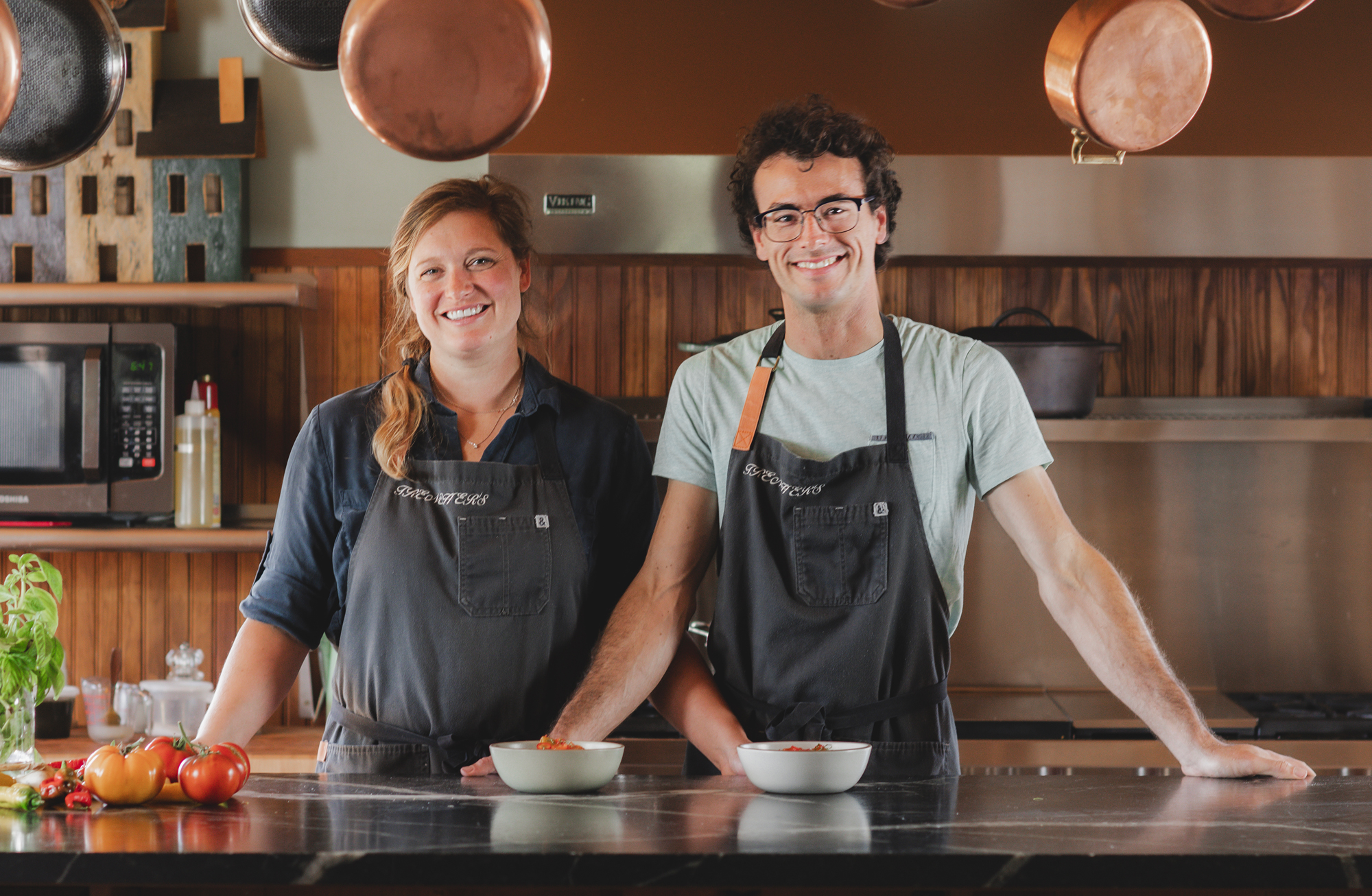
Jenny and Giacomo Vascotto bring Italian “cucina povera” to Vermont’s Northeast Kingdom.
“The problem with pasta,” said Giacomo Vascotto, “is that there are so many brands out there, but how many can you name that are exceptional? Probably none.”
The founders of Trenchers Farmhouse in Lyndonville, VT, Giacomo and his wife, Jenny, are setting out to change that, and they’re starting with eggs from their pasture-raised, heritage breed hens.
“Our goal is to be an exceptional brand with a superior product, bigger mouth feel, creamier texture, and bigger flavor,” said Giacomo. “And to have ingredients that are transparent from the ground up.”
“When we visit Giacomo’s mom in Italy,” said Jenny, “she goes from one farm to the next to buy everything she needs, maybe she stops into a specialty food store. It’s all so delicious because the ingredients are right there. The idea of Italian cucina povera, literally “poor kitchen,” really resonates with us. It’s about making great food with simple, high-quality ingredients.”
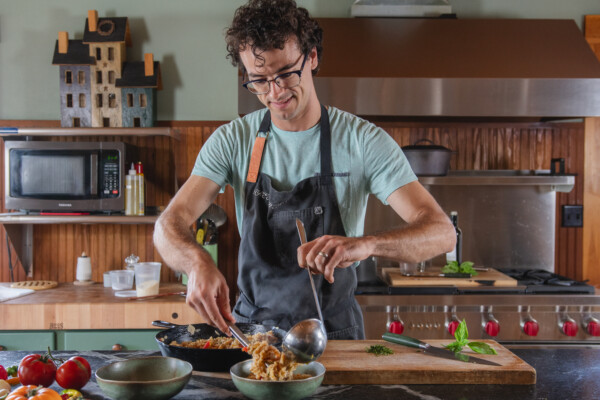
Giacomo Vascotto of Trenchers Farmhouse prepares a pasta dish in Lyndonville. “Our goal is to be an exceptional brand with a superior product, bigger mouth feel, creamier texture, and bigger flavor” he says. Photo by Erica Houskeeper.
Italian heritage in Vermont’s Northeast Kingdom
Both trained chefs, Giacomo and Jenny have worked in Michelin star kitchens around the world–from San Francisco to Japan to South Africa. They met at Dario Ceccini, a famous butchery in Italy known for “nose to tail” processing that utilizes the entire animal. “We met and fell in love,” said Giacomo, “with each other and with the idea of farm to table.” As they continued to work and travel, they also fell in love with the idea of making a better pasta–one that connected the consumer more directly to the farmers growing the ingredients.
“Even in the nicest restaurants in the world, you’re not always getting the best ingredients,” said Jenny. “I felt there was a big disconnect, even for chefs who really care about ingredients. Why don’t we know the farmer who grew the carrots? Or who butchered the meat? It’s something we feel passionate about. “
Jenny’s mother and her partner retired to Vermont in 2018 and invited Jenny and Giacomo to join them in the Northeast Kingdom. “Vermont was already in our minds,” said Giacomo, “and we had this amazing opportunity.” So, in 2019, they moved from San Francisco to Lyndonville, purchased their hens, and began making pasta.
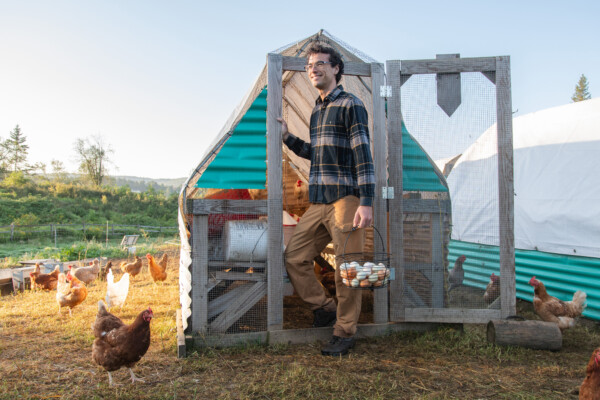
Giacomo Vascotto of Trenchers Farmhouse collects eggs from the couple’s chickens in Lyndonville. Photo by Erica Houskeeper.
Trenchers Farmhouse officially opened in the spring of 2020. Jenny and Giacomo set a cooler outside on the farm where neighbors could pick up bags of fresh pasta, homemade sauces, and Italian desserts like tiramisu. They also began selling at farmers markets in Montpelier and Littleton, NH. “Vermont was the most perfect place to open this business because of its strong emphasis on local food,” said Jenny. “The community really got behind us. If we could succeed and grow in 2020, in the middle of a pandemic, then we were like, ‘Okay, we’re doing pasta!’”
The following year, they put a farm stand on their property, built out a commercial kitchen, and doubled the number of farmers markets, adding Stowe and Burlington. By 2022, they had a few small wholesale accounts, selling their products in local markets and restaurants. But, they were feeling the constraints of their own resources.
“Farmers markets are our backbone,” said Jenny, “but they are exhausting, especially from Lyndonville. It’s just the two of us making the pasta, making the sales, going to the markets. The more we grew, the more we understood the limitations of being a team of just two.”
Navigating the move to wholesale.
It was at this juncture that Giacomo learned about the Vermont Sustainable Jobs Fund’s (VSJF) business coaching program. “When you think about fresh pasta, you think, “Oh, easy. Fresh flour, fresh eggs,” said Giacomo. “But the process of collecting eggs from my chickens to you eating pasta at the restaurant… there are so many different steps. Until you’re actually doing it and seeing the problems, it’s difficult to even know they exist. We didn’t have that personal experience.”
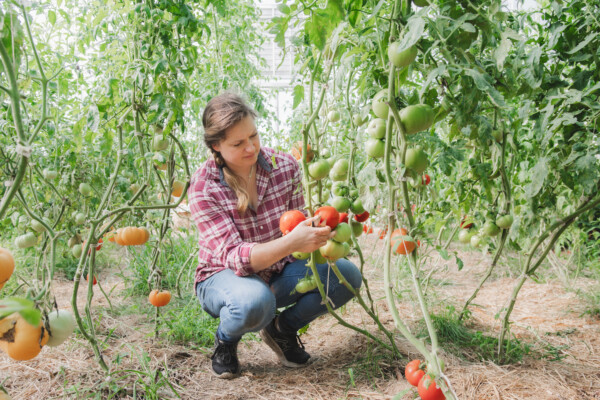
Jenny Vascotto inspects tomatoes in the couple’s greenhouse in Lyndonville. Photo by Erica Houskeeper.
“We were at the tip of the iceberg with wholesale,” said Giacomo, “but sort of in this Catch 22 where we needed distributors in order to work with bigger retailers, but we also needed bigger retailers to work with distributors. They don’t pick up just any product.”
With funding through the Community Navigator Pilot Program, Jenny and Giacomo were connected with VSJF coach, Steve Voigt, in December of 2022. “We knew we wanted to move into distributors,” said Jenny. “But we had no idea about the logistics involved.” A former executive at King Arthur Baking, Steve brought in fellow VSJF coach, Kathy Murphy-Moriarty, to further support Trenchers Farmhouse with sales and marketing expertise.
“We had both been kind of head down, this is what we’re doing,” said Jenny. “It’s hard to step back and look at the bigger picture when you’re busy filling orders. All the business decisions we were making were reactive. The coaches helped us step up and make proactive decisions that really took our business to a different level in 2023. I don’t know where we’d be without them.”
While Steve and Giacomo dug into margins and established metrics that would help the company measure progress, Kathy and Jenny worked on a wholesale marketing plan. The biggest takeaway from the coaches, says Giacomo, was not about numbers–it was being able to foresee and plan for what might be coming down the road.
“Every year, we have basically doubled sales and production,” he said. “For wholesale, in the last quarter alone, we grew 140 percent. It’s positive but also overwhelming. So, seeing your next problem and thinking about how you can address it… that’s a big lesson that you can apply to anything.”
Beyond the pasta.
“If we had been riding in a fast car last year,” said Giacomo, “then the last six months were like sitting on a rocket. That’s the metaphor.”
With projections for 2024 looking more like what they had hoped for 2025, the company shifted into high gear. They anticipated one or two distributors in 2023. As 2024 came to a close, they had four distributors and a fifth in the wings. They are getting calls from restaurants in New York and Boston asking for their pasta. “There’s plenty of pasta in those cities,” said Giacomo, “but they’re buying our story too, the happy chickens.”
Even though the timeline is accelerated, things are more or less progressing according to plan. Instead of being overwhelmed, Jenny and Giacomo feel in control. “In the past, we were growing but we had this looming feeling that we weren’t in charge of what was happening,” said Giacomo. “Now we are planning and we are in charge of the direction of the business.”
“With so much growth to be like, Yes! This is what we planned for, this is what we’ve been working toward and it’s happening relatively seamlessly because of the systems and structures we’ve set up–we’re very happy about that,” said Jenny.
As they look ahead, their goal is to become a brand that showcases Vermont agriculture and sustainable Italian food nationwide. “We can do pasta better and the Vermont agriculture system can support it,” said Jenny. “There are plenty of farmers and producers here in Vermont that can feed a national brand.” Trenchers Farmhouse currently buys all of its flour and grains from Nitty Gritty Grain Co. in Charlotte, VT and NEK Grains in Waterford, VT.
“Every single ingredient that goes into a product is an opportunity to vote for the kind of food you want to eat,” she said. “And it makes a big deal of difference in flavor, texture and nutrition. It goes beyond the pasta. We’re doing something different and you can taste when food is made with love and care.”
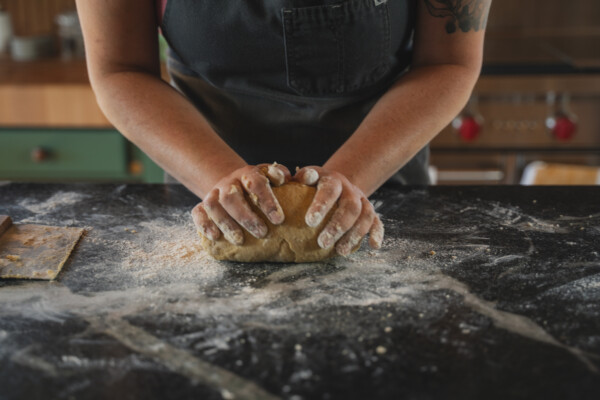
Making great food with simple, high-quality ingredients is a value Giacomo and Jenny live by. Photo by Erica Houskeeper.
About VSJF’s Business Management Coaching Program
The Vermont Sustainable Jobs Fund provides tailored, high-touch planning, coaching, and advising for business owners and their management teams to advance profitability, job creation, and sustainable job development. Click for more information about business management coaching. Funding support for our coaching program is provided by client fees, the SBA-Community Navigator Pilot Program, the Vermont Agency of Agriculture, Food and Markets, and Vermont Housing & Conservation Board’s Farm & Forest Viability Program.
Read More Stories Like This:
- Business Sense – complete FREE training series for entrepreneurs and small business owners now available
- WheelPad Entrepreneur Julie Lineberger is Keeping Families Together
- A Farm, a Family, a Way of Life
- From Chocolate to Chili Peppers
- Junction Fiber Mill: Knitting a Business Together
- Creating a Regional Food System, One Warehouse at a Time
- The Roots Farm Market Brings a New Approach to the Old General Store
- Babette’s Table: Using Projections to Grow with Intention
- Bobolink Yarns: Scaling Back to Find Success
- Hemp and Cannabis Pioneer, Scott Sparks, Navigates Legalization in Vermont




